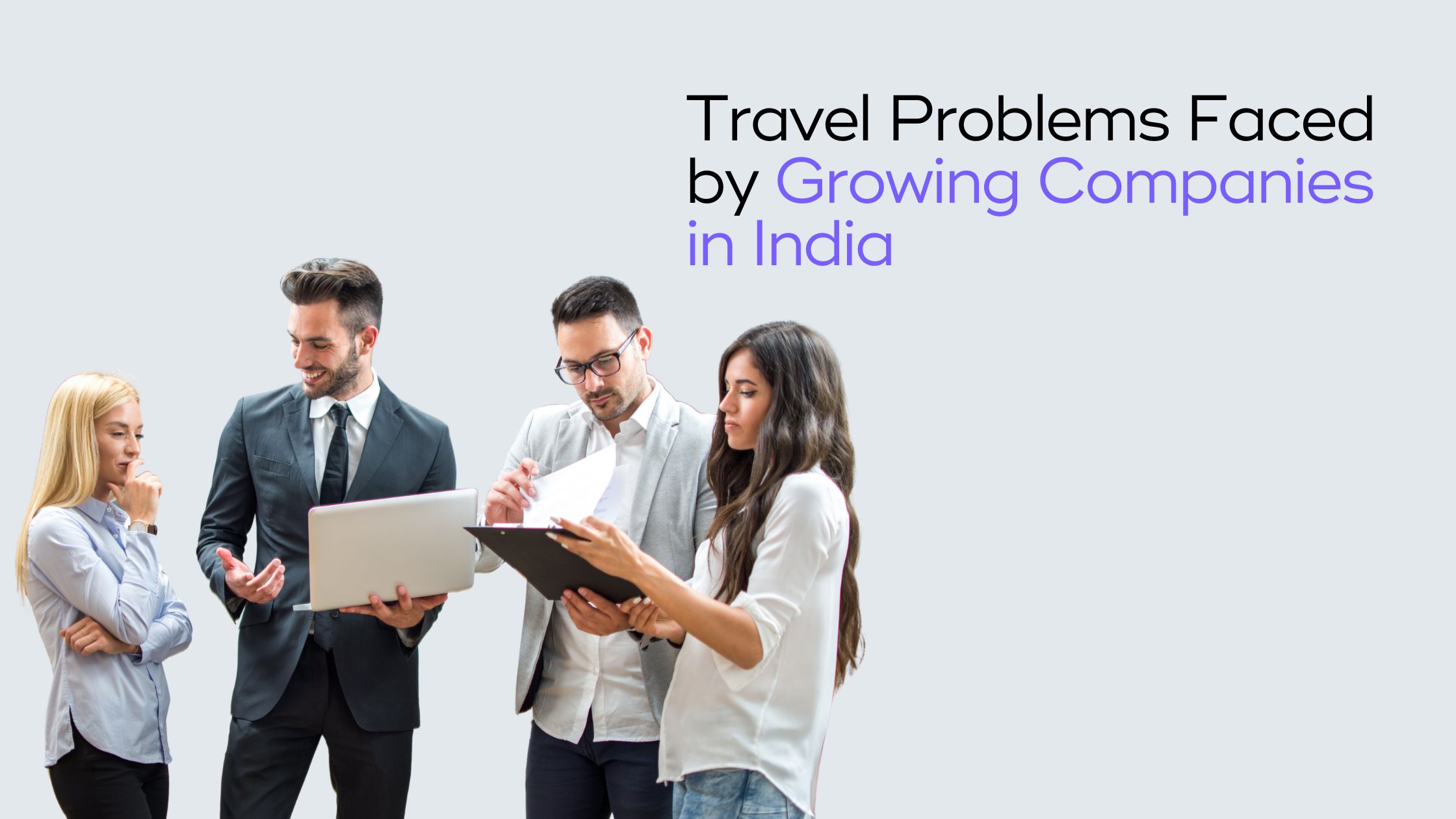As a growing company in India, HR teams are busy celebrating wins — new hires, bigger projects, and a stronger market presence. But with growth comes hidden challenges, and one of the most overlooked is managing business travel.
In today’s fast-paced Indian business environment, travel is essential — whether it’s for sales meetings, client visits, or team events across cities. What used to be a quick task now takes hours — booking cabs, flights, hotels, chasing approvals, and handling reimbursements.
Before you know it, travel starts pulling focus from your core HR work like engagement, retention, and compliance.
This blog will help you simplify business travel, save time, and keep your team stress-free.
1. Growing Demands of Travel Among Different Department
Business travel used to be simple for smaller teams — book a flight, reserve a hotel, arrange a cab, and be done. But as your team grows, travel becomes anything but easy.
When your team grow it is not just about booking tickets. It’s about managing budgets, ensuring policy compliance, supporting employee productivity, and making the whole process smooth and efficient. And for HR, that means more layers and more responsibility.
Your employees are traveling more than ever for:
- Sales meetings and client relationship building
- Project execution and on-site delivery
- Conferences, training, and exhibitions
- Internal team alignment and planning sessions
- Incentives and Reward Ceremonies
In fact, Deloitte’s 2024 Corporate Travel Outlook shows that most frequent travel is driven by client projects (23%) and sales (21%) — far more than conferences and exhibitions(13%).
For HR, it’s no longer just about where employees are going — you also need to track:
- How much each trip costs
- Which departments are traveling the most
- Trends in bookings, cancellations, and hotel preferences
- Whether travel is bringing real ROI
- If your policies are still working for today’s needs
As the travel load increases, so does your time spent on it — managing bookings, chasing approvals, handling last-minute changes, and fixing issues.
And that’s when it starts affecting your real job — building people strategies, not coordinating travel chaos.
Let’s now look at just how much time HR is losing to all this…
2. Managing Time to Manage Employee’s Travel
Planning a single business trip takes around 9 hours, according to a Skift report. Multiply that by 40–50 trips a month, and you’re losing 360–450 hours monthly to just travel tasks.
That’s time you could’ve spent on employee engagement, onboarding, or strategy. And it gets worse with each new hire.
According to reports, Small and mid-sized companies often spend 70% more time managing travel than those using streamlined systems.
The biggest culprits?
- Chasing approvals
- Last-minute itinerary changes
- Endless coordination with vendors
- Reimbursement delays
Your time is valuable. If you’re still handling travel manually, you’re burning hours on tasks tech can easily automate.
3. Pre & Post Travel Headaches
As your workforce expands, travel requests multiply. Here’s what starts to hurt the most:
1. Approval Bottlenecks
The more people, the more approval layers. Without a structured workflow, pre-trip and budget approvals get stuck, causing booking delays and last-minute costs.
2. Reimbursement Overload
Each new employee means more expense reports. Without a centralized system, tracking claims becomes a full-time job, riddled with errors and employee frustration.
3. Vendor Coordination
Juggling multiple vendors (hotels, cabs, airlines) manually leads to inconsistent service, missed discounts, and invoice chaos.
As a result, HR loses productivity, employees lose trust in the process, and finance teams get overwhelmed with poorly tracked spending.
4. Increasing Travel Cost with Addition of New Workforce
As your team grows, your travel expenses grow too — that’s a reality every HR team in a growing company faces.
More employees mean more trips — for meetings, training, client visits, and more. And while each trip might seem minor, the total cost adds up fast.
Let’s say you have 100 employees. If just 70 of them travel 3 times a year, that’s 210 trips — and that’s a conservative estimate.
According to the Deloitte 2024 Corporate Travel Survey:
- 77% of employees take 1–5 business trips a year
- 15% travel 6–10 times
- 7% go on more than 10 trips
How much just a new employee adds in a travel budget?
That means each new hire could add 3 to 6 trips annually, quickly driving up overall costs.
Now, let’s talk numbers. As per the Booking.com for Business 2024 Report:
- The average global cost of a business trip is $1,771 (₹1.53 lakh*)
- An international trip costs about $2,000 (₹1.73 lakh*)
- Even a domestic trip can cost around $500 (₹43,260*)
*1 USD = INR 86.52
With addition of each employee, the average yearly cost would increase 4 to 9 lakhs INR. Now think what would happen if you are hiring 10, 25, or 50 employees this year.
| Employees Hired | Annual Travel Cost Increase (Minimum) | Annual Travel Cost Increases (Maximum) |
|---|---|---|
| +1 | 4.59 Lakhs | 9.18 Lakhs |
| +10 | 45.9 Lakhs | 91.8 Lakhs |
| +25 | 1 Crore 14 lakhs | 2 Crores 29 lakhs |
And without a solid system to track and manage travel, the budget can spiral before you realize it. You may not control how much people need to travel — but you can control how they do it.
That’s where a smart, scalable travel policy comes in. Let’s explore what a good policy should include next.
Build a Smart Travel Policy That Grows With Your Team
A good travel policy is your first line of defense against chaos. Whether your team is 50 or 500, your policy should be clear, simple, and consistent.
Here are 7 must-have elements:
- Scope
Define what counts as official business travel. Is it only client-facing meetings, or does it also include internal team retreats and training events? - Budgets
Set travel allowances based on employee grade, location, or trip purpose. This ensures your travel budget aligns with the actual travel needs. - Approval Flow
Define who approves what and how fast the process should move. A clear, efficient approval system minimizes delays and ensures travel is booked on time. - Preferred Vendors
List preferred airlines, hotels, and transportation services that employees should use. This not only streamlines bookings but can also secure better rates. - Reimbursement Rules (If you are opting for Reimbursement Model)
Clarify which documents are required, what expenses are reimbursable, and how long the reimbursement process takes. This ensures everyone is on the same page when it comes to claims. - Safety Guidelines
Include emergency procedures, travel assistance services, and what employees should do if something goes wrong during their trip. The safety of your employees should always be a priority. - Bleisure Travel
Can employees extend their business trips for personal reasons? Make sure the guidelines are clear on this, including how to request and manage it.
A great policy doesn’t just save money — it makes travel stress-free, faster, and fair for everyone.
But setting the policy is just the beginning. For a growing company in India, as your employees start traveling, their safety and well-being must be your top priority. A strong support system ensures they feel secure, cared for, and ready to focus on their work — no matter where they’re headed.
5. Duty of Care
For a growing company in India, employee safety during business travel is more than a formality — it’s a critical responsibility.
As soon as an employee steps out for a work trip, their safety becomes your duty.
This means:
- Tracking where they are
- Providing emergency contacts and alerts
- Ensuring access to 24/7 support
- Keeping medical info secure and updated
Whether it’s a flight delay, local unrest, or a medical issue, your team expects real-time support. Many countries legally require proof that companies take steps to ensure employee safety during business travel — failure can lead to serious consequences.
But more importantly, care builds trust. And trust creates better employee experiences.
6. Employee Travel Experience
Work travel isn’t just about getting from point A to B — it’s about how employees feel along the way.
As an HR professional in a growing company in India, you’re not just managing bookings and approvals. You’re also asking:
- Is this trip motivating or exhausting for the employee?
- Do they get time to unwind while away?
- Are they returning refreshed — or completely drained?
This is where bleisure travel shines — a mix of business and leisure. In fact:
- 60% of business travelers extend their trips for personal time (Expedia)
- 30% would take a lower-paying job if it offered more travel and 57% of companies now allow bleisure trips for millennial and Gen Z teams (Forbes)
It’s clear employees care about the overall experience, not just the purpose of the trip. A well-planned journey gives them a mental break, boosts morale, and leads to more engaged, productive teams.
And that naturally brings us to the next question – can great travel experiences help you hire and retain top talent?
Let’s find out.
Travel’s Role in Hiring & Retention
If you’re part of a growing company in India looking to attract and keep top talent, make travel a perk — not a pain.
- Offsites and reward trips build team culture
- Bleisure policies support work-life balance
- Seamless travel experiences show you care
Bad travel — delays, confusion, poor support — is often a hidden reason for disengagement. But when employees feel supported, they stay longer, perform better, and promote your culture.
CoTrav: The Smart Travel Solution for HR Teams
All the challenges we’ve covered — approvals, compliance, rising costs, employee satisfaction — point to one clear need:
HR needs a travel platform that can grow with the company.
That’s exactly where CoTrav steps in.
Save Up to 30%
- Get access to pre-negotiated rates on flights, hotels, cabs, trains, and buses
- Monitor spending in real-time
- 100% GST-compliant invoicing = no tax leaks
No Reimbursements, No Headaches
- All bookings are done within the platform
- Employees don’t pay upfront
- No more chasing bills or reconciling spreadsheets
Instant Approvals
- Approvals follow your org structure
- Managers get real-time alerts and can approve with one click
- Fast, smooth, and confusion-free
Real-Time Travel Insights
- See who’s traveling, how much is spent, and if policies are followed
- Filter by employee, department, or destination
- Make decisions backed by real-time numbers, not guesswork.
Easy Booking for All Travel Needs
- Book flights, hotels, trains, buses, and cabs — all in one place
- Simple interface with guided steps
- Keeps everyone within policy without the hassle
24/7 Support
- Travel emergencies? We’ve got your back — anytime, anywhere
Auto GST Invoice Collection
- No need to follow up with vendors
- CoTrav collects all GST bills for you
- Maximize your tax credit effortlessly
With CoTrav, HR doesn’t just manage travel — it leads it with confidence, control, and complete peace of mind.
Conclusion
As a growing company in India, while growth brings many challenges, travel doesn’t have to turn into a burden. With the right tools, clear policies, and a reliable partner like CoTrav, managing business travel becomes easier — and smarter.
It’s more than just booking tickets. It’s about saving time, controlling costs, keeping your people safe, and delivering a smooth travel experience every time.
Let technology handle the chaos, so you can focus on what truly matters — your people.




